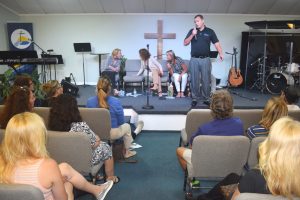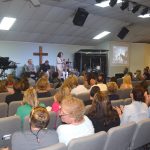
BERLIN — A community coming to grips with the harsh realities of heroin and opiate addiction came together in a big way on Tuesday night and became local warriors fighting side by side against America’s greatest epidemic.
“I don’t want to hear about one more child dying from heroin abuse,” said Jackie Ball, one of the lead organizers of the Worcester County Warriors Against Opiate Addiction group, “and no one else in this room does either.”
In just the group’s second official meeting, around 200 people packed into the OC Worship Center just outside Berlin to listen, to learn, to talk and to lean on one another.
There were many tears. There were long and heartfelt hugs. There were bone chilling personal stories from audience members, and there were former addicts in the crowd who stood up as a living testimony that there is hope and the disease of addiction does have a cure.
“I have been in those shoes before,” said Corey Hassett, a former heroin addict from the area who is now a counselor in Florida for Amethyst Recovery Center. “My parents were completely blind to the treatment options available here for their son who was shooting heroin in their basement.”
Yet, if making people realize the entire scope of this terrifying issue was the goal of this gathering, it was as comprehensive as it was inspiring as representatives from all corners of the county took turns on the microphone loudly proclaiming their intent and their role in stopping the spread of heroin addiction in our community.
“We all have a role in fighting this war,” said Delegate Mary Beth Carozza. “Think of your own sphere of influence in the community and think about how many people you could affect with this message. Our message has to be this drug is so powerful, you can’t even start.”
While the inspiration and the message was both real and clear, so was the fear about the dangers of heroin addiction.
“Heroin is a completely different animal,” said Dr. Michael Finnegan, a Salisbury based psychologist who also sits on the Governor’s Heroin and Opiate Addiction Taskforce. “Data that just came out from Hopkins says relapse rates for opiate addiction don’t drop to 15% for five years. One program, one treatment facility, one church and one group isn’t going to solve this problem.”
Finnegan spoke about the need for communities to commit to working together for the long haul, but on the short term, focus on what he called immediate harm reduction.
“People are dying tonight and there will be many people that die across our state tonight because a person every 19 minutes is dying from opiate and heroin abuse in our country. Even before treatment starts, every family should have Narcan or Naloxone because that stops death. Everyone that has a family member that suffers from Opiate Abuse Disorder should have this in their household because it saves lives.”
Often called the “Opiate Antidote”, Narcan, also known as Naloxone, is becoming much more readily available, and training is also offered on how to use it, as was explained by the team of health officials and counselors at the Worcester County Health Department.
“The thing that is missing in Maryland and across our country is this individual peer support,” said Finnegan. “We need to use the energy and the suffering in this room for constructive purpose. If you want to make a difference, speak up with courage. You are a powerbase. It won’t be one father or one mother, we all need to stand up and scream about this problem.”
Kutresa Lankford is the Clinical Advisor for Addictions in Worcester County. She was stunned by the turnout and spoke about the growing resources in the county for addicts and for the families of addicts.
“This is where it begins for our community to start the healing process,” said Lankford. “Worcester County Health Department wants to be part of the solution, but we know we don’t have all the answers.”
Lankford spoke of the treatment available at four locations in the county including the WACS center in West Ocean City, while Worcester County State’s Attorney Beau Oglesby and Worcester County Sheriff’s Office Sgt. Nate Passwaters, who heads up the county’s Drug Task Force, explained the enforcement and the prosecution side of the battle.
“We will hold people accountable for criminal behavior but we know we can’t arrest our way out of this problem,” said Oglesby, “but we want the message to be clear that selling poison for profit will not be tolerated in this community.”
Oglesby and Passwaters both acknowledged that there is no “one size fits all” approach to stopping this epidemic, they each stressed the need for education, both early and often, in schools.
Getting that message to kids is the job of Jake Windsor, who is currently Worcester County’s sole adolescent counselor. Windsor is a former opiate addict and has been clean for six years.
“We are finally getting away from the cookie cutter approach to treatment,” he said, “but we need to help addicts get the simple things they need after treatment so they have a better chance at staying clean, like transportation, housing, and jobs.”
Steve Price, who was there representing the Board of Education for Worcester County’s Public Schools, echoed the sentiments of all the speakers that this problem was unique and the school system is committed to doing its part.
“The challenge has changed, so we have to be different,” he said. “I am here to show that the intent of Worcester County Public Schools is committed to this issue. As a grandfather of three boys in the school system, I’m terrified too. Our school system is ready to partner with anyone to stop this.”
Heidi McNeely started the Worcester Warriors group after battling through years of her own son’s addiction and being simultaneously angered and devastated by the growing number of heroin related deaths and horror stories in recent months.
Her hands trembled around the microphone as she spoke, especially when introducing her son, Sean, now several months clean who quietly sat on stage the entire time. McNeely admitted she was completely overwhelmed by the turnout, but she and Jackie Ball have now sharpened the focus of this group. It’s one thing to exist, but it’s another to organize and unify and move forward together in that search for a solution. Simply put, they say this meeting won’t be a one off.
“The OC Worship Center has committed to having us here every Tuesday through December,” McNeely told the crowd, “if you are interested in our sub-committees please sign up and leave your information.”
McNeely says there will be four committees: Education, Awareness, Support and Navigation. While each group may focus on different aspects of this issue, all will play a vital role in making sure that this community is not just informed about the dangers of heroin and opiate addiction, but it also knows what to do and where to go for help.
“We have to keep the momentum going,” said Ball. “Take this message and pass it along.”
Carozza challenged the audience to “follow through” with the commitment and this battle to free this community from the chains of addiction.
As the room cleared on Tuesday night, there were more hugs and more tears, but there were a noticeable number of smiles. Perhaps, in order to battle a drug that renders so many powerless, the only comfort can come from that sense of power in numbers. A community that knows that it has a real and scary problem showed up on Tuesday night. That community drew a definitive line in the sand, and it sounded its rallying cry on all fronts of the battlefield. This week, a small coastal community became warriors against opiate addiction and dug in its heels for the battles that inevitably lay ahead.

